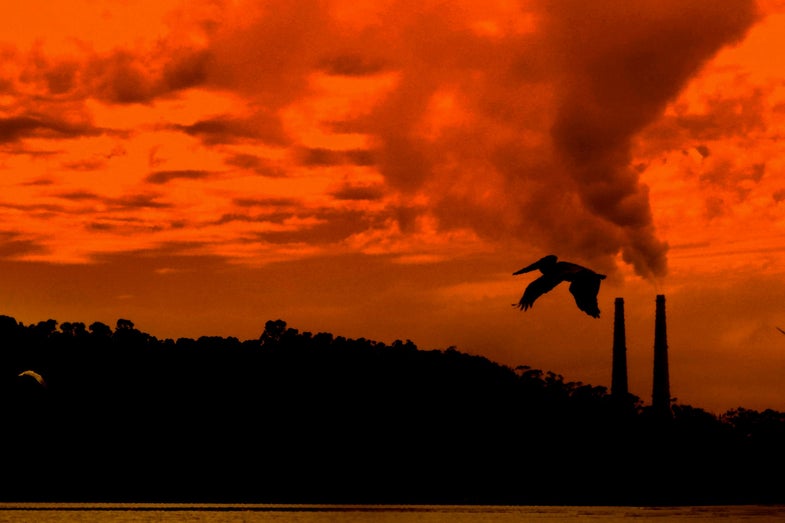Earth Day is a celebratory affair. It’s about appreciating the planet that we live on, and all of the goods and services it provides. In many ways, it’s a celebration of just being alive. But Earth Day is also a time for reflection. It’s a time to take stock of our planet’s health, and in turn, our health. Unfortunately doing so is always going to be uncomfortable, because we tend to be pretty good at destroying things. So let the self-flagellation begin.
Climate Change
Excessive burning of fossil fuels by humans has released exorbitant amounts of carbon dioxide, methane, and other greenhouse gases into the atmosphere. Trapping heat, they have raised Earth’s temperature 1.5 degrees F in the past century. As a result, changes in weather and climate have caused more frequent floods, droughts, storms, and extreme heat waves. In addition, melting ice caps are causing global sea levels to rise, which could lead to mass migrations of millions of refugees away from the coastal cities within the coming century. This year, the amount of ice in the Arctic was the lowest it’s ever been. Most, if not all of the problems on this list either contribute or are exacerbated by climate change in a deadly positive feedback loop.
Land Degradation
This occurs in many forms and for many different reasons, but the resulting outcome is the same: An environment and ecosystem is damaged or depleted of its resources to the point where it can no longer function as it should. This can be gouged, polluted earth from open pit mining like mountaintop removal, forest loss from tree cutting, over farming causing soils to desertify, and much more. Approximately 17 percent of the Amazon rainforest has been cut down in the last 50 years.
Overfishing
Starting in the 1800s with the wholesale destruction of whale populations, humans have continued to pull from the world’s oceans with very little regulation and much higher technology. 80 percent of the world’s fisheries are overexploited or on the verge of complete and total collapse. Further, 90 percent of predatory fish stocks (fish like tuna) are gone. Overfishing has serious economic consequences. In 1992, when the cod fishery collapsed off of Newfoundland, it caused some 40,000 people their jobs.
Wildlife Poaching
The current rate of global species loss is such that many scientists believe we are in the midst of a mass extinction event, except we’re the culprits, not asteroids, this time. And while habitat destruction is likely the biggest player in species extinction, illegal poaching for wildlife parts is currently running amok and putting species under serious stress. In Africa, 100,000 elephants were killed for their ivory in just 3 years from 2010 to 2012. And the killing continues.
Coral Bleaching
As ocean temperatures continue to rise, stressed corals expunge the colorful symbiotic algae that live within their tissues, causing them to turn a ghostly white. And while this doesn’t mean that the coral is dead, that’s usually what eventually happens once they’ve reached this state. Reefs house 25 percent of marine species as well as protect shorelines. When they die that usually means the total collapse of an entire ecosystem. Bleaching events are becoming all too common due to climate change.
Ocean Trash
Plastics make their way to Earth’s oceans like moths to a flame. As of December 2014, scientists estimated there to be 300,000 tons of plastic floating and swirling on the surface of the globe’s seas in huge gyres. And that’s not taking into consideration the plastics that have likely sunk to the sea floor. That could put the number up to five million tons.
Food Waste
Over 800 million people on the planet are starving, yet a third of all the food produced globally per year—about 2.9 trillion tons of it—is discarded or lost. That is enough to feed all of those who need it two times over. What’s more, rotting food waste in landfills produces methane, a nasty greenhouse gas. A lot of it. If food waste were a country, it would be the third largest emitter of greenhouse gases on the globe, behind China and the U.S.
Water Scarcity
Approximately 1.2 billion people on the planet suffer from physical water scarcity, and a further 1.6 billion suffer from economic water scarcity as a result of poor infrastructure. Yet while nearly 3 billion people suffer from water shortages, large amounts of freshwater are polluted and mismanaged. Hydraulic fracturing of oil and gas, which is widespread across the United States, can use up millions of gallons of freshwater just on a single well. The above satellite image is of the Aral Sea, a lake between Kazakhstan and Uzbekistan, which dried up between 1989 (left) and 2014 (right).
Overpopulation
In 1960, there were 3 billion humans on planet Earth. Today there are over 7 billion. By 2050, most experts believe there will be 9 billion. More people means more of a drain on Earth’s resources and more mouths to feed.










